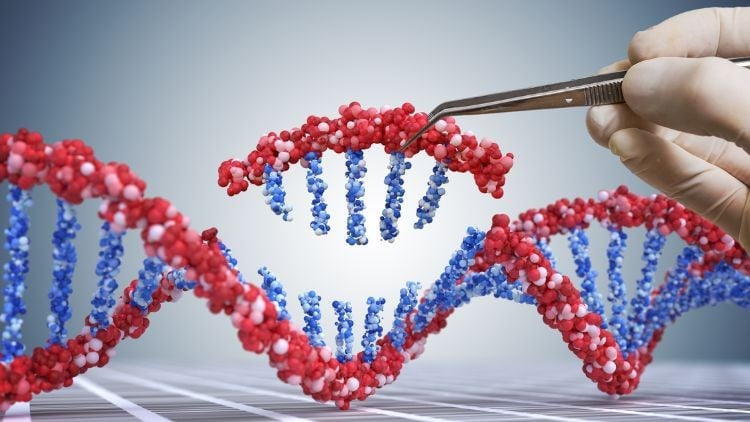
Mastering Precision: A Deep Dive into Genetic Engineering with CRISPR
⏱️ Length: 50 total minutes
⭐ 4.22/5 rating
👥 4,679 students
🔄 August 2024 update
Add-On Information:
Note➛ Make sure your 𝐔𝐝𝐞𝐦𝐲 cart has only this course you're going to enroll it now, Remove all other courses from the 𝐔𝐝𝐞𝐦𝐲 cart before Enrolling!
-
Course Overview
- Explore the fundamental science behind CRISPR-Cas systems as natural bacterial defenses.
- Understand the adaptation of CRISPR into versatile, precision gene-editing tools.
- Trace the historical journey and rapid evolution of genome editing technologies.
- Differentiate between key CRISPR platforms: Cas9, Cas12, prime, and base editing.
- Examine their distinct mechanisms and applications for various genetic modifications.
- Discuss the crucial ethical considerations and societal implications of CRISPR technology.
- Analyze CRISPR’s transformative impact on medicine (disease treatment, therapies).
- Learn about its applications in agriculture (crop resilience, yield enhancement).
- Discover industrial and fundamental research uses, including microbial engineering.
- Master the principles of designing highly specific guide RNAs (gRNAs).
- Understand factors for optimal gRNA specificity and minimizing off-target effects.
- Investigate various CRISPR delivery methods: viral (AAV, lentivirus) and non-viral.
- Evaluate the advantages and limitations of different delivery strategies.
- Learn strategies to mitigate off-target editing and ensure editing precision.
- Recognize the role of bioinformatics tools in CRISPR design and analysis.
- Explore emerging CRISPR technologies and future frontiers in genetic engineering.
- Touch upon advanced concepts like gene drives and epigenetic editing.
- Understand CRISPR’s potential in diagnostics and rapid pathogen detection.
-
Requirements / Prerequisites
- Basic understanding of molecular biology (DNA, RNA, proteins).
- Familiarity with fundamental genetics concepts (genes, heredity).
- Knowledge of basic cell biology (structure, function, gene expression).
- No prior direct CRISPR experience is necessary.
- Strong interest in cutting-edge biotechnology and scientific innovation.
- Reliable internet access and a computing device.
- Capacity for critical thinking and scientific inquiry.
- Openness to exploring ethical dimensions of advanced technologies.
-
Skills Covered / Tools Used
- Conceptual design of optimal guide RNAs for gene targeting.
- Interpretation of CRISPR experimental results (e.g., indel detection).
- Understanding various CRISPR delivery vectors and selection.
- Familiarity with bioinformatics tools for gRNA design and off-target prediction.
- Conceptual analysis of gene editing outcomes via sequencing data.
- Problem-solving approaches for common CRISPR experimental challenges.
- Formulating research questions addressable with CRISPR.
- Conceptualizing CRISPR applications for gene therapy or agriculture.
- Applying ethical reasoning to genetic engineering scenarios.
- Basic understanding of intellectual property in gene editing.
- Awareness of conceptual laboratory safety for genetic manipulation.
- Evaluating gene editing efficiency and specificity.
- Exposure to online resources for CRISPR validation.
-
Benefits / Outcomes
- Ability to critically assess scientific literature on CRISPR.
- Confidence in discussing complex gene editing concepts clearly.
- Strong foundation for advanced studies or research in genomics.
- Informed perspective on precision medicine’s transformative potential.
- Insight into regulatory landscapes for gene-edited products.
- Understanding bioethical debates surrounding human germline editing.
- Empowerment to contribute to future biotechnology innovations.
- Enhanced ability for interdisciplinary scientific discussions.
- Recognition of commercial potential and market trends in gene editing.
- Improved scientific literacy and critical evaluation skills.
- Capacity to explain CRISPR to non-scientific audiences effectively.
- Preparedness for engaging in policy discussions on genetic technologies.
-
PROS
- Highly Current and Relevant: Addresses a cutting-edge scientific topic with immediate applicability.
- Time-Efficient Learning: Comprehensive overview in a concise 50-minute format, ideal for busy schedules.
- Demonstrated Student Satisfaction: High rating (4.22/5) from a large student base signifies quality.
- Expansive Learning Community: Connect with nearly 4,700 students for collaborative learning.
- Up-to-Date Content: August 2024 update ensures the curriculum reflects the latest advancements.
- Accessible Introduction: Provides a clear entry point into complex genetic engineering concepts.
- Expert-Led Instruction: Learn directly from industry professionals and renowned experts.
-
CONS
- Limited Practical Depth: The brief 50-minute duration restricts comprehensive hands-on simulation or deep experimental troubleshooting, focusing more on conceptual understanding.
Learning Tracks: English,Teaching & Academics,Online Education
Found It Free? Share It Fast!